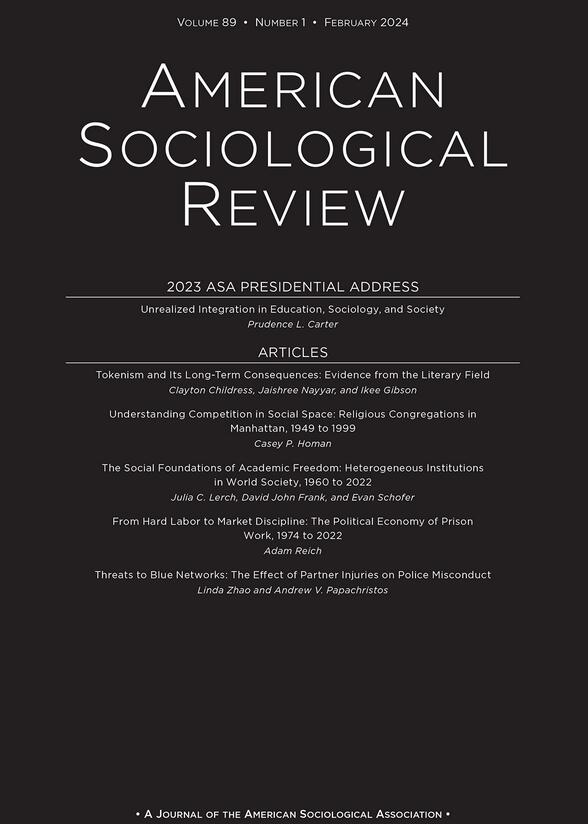通过前门:为什么组织(仍然)更喜欢遗产申请人?
IF 6.2
1区 社会学
Q1 SOCIOLOGY
引用次数: 1
摘要
在筛选候选人时,组织通常会根据某些申请人的家庭关系优先考虑他们。这种“遗留偏好”在大学招生中尤为普遍,被批评为助长了不平等和阶级再生产。尽管如此,研究仍然报告说,遗产的入院率一直高于非遗产。在这篇文章中,我们提出了一个理论框架,其中包括三种不同的决策策略,即精英逻辑、物质逻辑和多样性逻辑。然后,我们利用寻求进入美国一所精英大学的申请人的全面数据,应用这个框架来调查遗留偏好是如何支持或破坏每一种组织逻辑的。我们发现,以其他两种组织逻辑为代价,有力地支持了物质逻辑:遗产在毕业后成为更好的校友,拥有更富有的父母,他们在物质上比非遗产父母更慷慨。与精英主义逻辑相反,我们发现遗产既不是更合格的申请人,也不是学业更好的学生。从多样性的角度来看,遗产的种族多样性不如非遗产。最后,我们讨论了我们的研究对理解家庭关系和裙带关系在当今组织选拔过程中的作用的影响。本文章由计算机程序翻译,如有差异,请以英文原文为准。
Through the Front Door: Why Do Organizations (Still) Prefer Legacy Applicants?
When screening candidates, organizations often give preference to certain applicants on the basis of their familial ties. This “legacy preference,” particularly widespread in college admissions, has been criticized for contributing to inequality and class reproduction. Despite this, studies continue to report that legacies are persistently admitted at higher rates than non-legacies. In this article, we develop a theoretical framework of three distinct sense-making strategies at play when decision-makers screen applicants into their organizations—the meritocratic, material, and diversity logics. We then apply this framework to investigate how legacy preferences either support or undermine each organizational logic using comprehensive data on the population of applicants seeking admission into one elite U.S. college. We find strong support for the material logic at the cost of the other two organizational logics: legacies make better alumni after graduation and have wealthier parents who are materially-positioned to be more generous donors than non-legacy parents. Contrary to the meritocratic logic, we find that legacies are neither more qualified applicants nor better students academically. From a diversity standpoint, legacies are less racially diverse than non-legacies. We conclude with a discussion of our study’s implications for understanding the role of family relationships and nepotism in today’s organizational selection processes.
求助全文
通过发布文献求助,成功后即可免费获取论文全文。
去求助
来源期刊

American Sociological Review
SOCIOLOGY-
CiteScore
13.30
自引率
3.30%
发文量
35
期刊介绍:
The American Sociological Association (ASA) is a non-profit membership association established in 1905. Its mission is to advance sociology as a scientific discipline and profession that serves the public good. ASA is comprised of approximately 12,000 members including faculty members, researchers, practitioners, and students in the field of sociology. Roughly 20% of the members work in government, business, or non-profit organizations.
One of ASA's primary endeavors is the publication and dissemination of important sociological research. To this end, they founded the American Sociological Review (ASR) in 1936. ASR is the flagship journal of the association and publishes original works that are of general interest and contribute to the advancement of sociology. The journal seeks to publish new theoretical developments, research results that enhance our understanding of fundamental social processes, and significant methodological innovations. ASR welcomes submissions from all areas of sociology, placing an emphasis on exceptional quality.
Aside from ASR, ASA also publishes 14 professional journals and magazines. Additionally, they organize an annual meeting that attracts over 6,000 participants. ASA's membership consists of scholars, professionals, and students dedicated to the study and application of sociology in various domains of society.
 求助内容:
求助内容: 应助结果提醒方式:
应助结果提醒方式:


